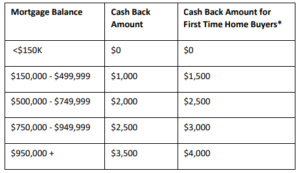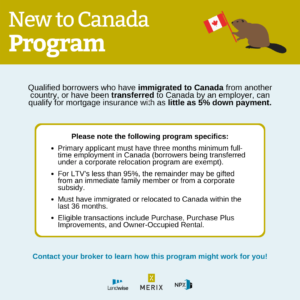1 – Default Insurance
The first and perhaps most common form of insurance when discussing the mortgage space is known as “default insurance”. The purpose of mortgage default insurance is to protect the lenders, allowing them to lend money more aggressively.
This type of insurance is mandatory for any homes where the buyer puts less than 20 percent down on the purchase. In fact, default insurance is the reason that lenders accept lower down payments, such as 5 percent minimum, and actually helps these buyers access comparable interest rates typically offered with larger down payments.
In Canada, there are only three companies that offer default insurance: Canada Mortgage and Housing Corporation (CMHC), which is run by the federal government and two private companies: Genworth Financial and Canada Guaranty. Default insurance typically requires a premium, which is based on the loan-to-value ratio (mortgage loan amount divided by the purchase price). This premium can be paid in a single lump sum or it can be added to your mortgage and included in your monthly payments.
According to CMHC, the minimum down payment required for mortgage loan insurance depends on the purchase price of the home:
- For a purchase price of $500,000 or less, the minimum down payment is 5 percent.
- When the purchase price is above $500,000, the minimum down payment is 5 percent for the first $500,000 and 10 percent for the remaining portion.
It is also important to note that default insurance (or mortgage loan insurance) is available only for properties with a purchase price or an improved/renovated value below $1 million.
2 – Title Insurance
Another insurance policy that potential homeowners may encounter is known as “title insurance”. This is an insurance policy that protects residential or commercial property owners and their lenders against losses relating to the property’s title or ownership. In fact, it is so important to lenders that every single lender in Canada requires you to purchase title insurance on their behalf. It is not a requirement to have coverage for yourself, but that doesn’t mean you should dismiss it outright.
Title insurance can protect you from existing liens on the property’s title, but the most common benefit is protection against title fraud. Title fraud typically involves someone using stolen personal information, or forged documents to transfer your home’s title to him or herself – without your knowledge. The fraudster then gets a mortgage on your home and disappears with the money. As the old adage goes: “It’s better to be safe than sorry” and the same goes for insurance.
Similar to default insurance, title insurance is charged as a one-time fee or a premium with the cost based on the value of your property. Title insurance for the lender is typically $250 to $300, while title insurance for yourself runs around $125 to $150. You can purchase title insurance through your lawyer or title insurance company, such as First Canadian Title (FCT).
3 – Mortgage Protection Insurance
Before you sign off on your mortgage, there is one more type of insurance your mortgage broker should tell you about – Mortgage Protection Insurance. Despite being optional, it should still be considered. Almost every mortgage broker in the business has a story of someone who passed on the extra coverage and tragedy hit.
Unfortunately, life happens but it doesn’t have to happen to your home. While you may not want to spend the money now, or maybe you already have some type of life insurance policy through work, don’t discount this option as it is often a blessing in disguise – especially when it comes to homeowners with a spouse and children. Can they carry on with the mortgage payment? If not, they would be forced to sell on top of everything else. For a few extra dollars a month, mortgage protection insurance provides that safety net in the event it is ever needed.
When it comes to choosing a mortgage protection plan, there are a number of different policies available depending on your budget. Manulife’s Mortgage Protection Plan offers immediate insurance and can be canceled at any given time. If you think you may be covered through your work, it can’t hurt to take a closer look at the policy.
Mortgage insurance is what we consider “debt replacement” and life insurance is more fitting as an “income replacement”. This is an important distinction and you should understand the difference. You also need to see just how much you’re going to get through your life insurance policy; you may be surprised just how little it amounts to.
Alternatively, you can look to a Financial Planner for a term policy, I am happy to provide that referral.
4 – Property + Fire Insurance
Lastly, after you’ve signed off on your mortgage you need to close on the home. Before you do this, your lender is going to require home insurance. When it comes to home insurance, there are many different types of coverage however it generally protects you from damage to the home that is accidental or unexpected, such as a fire.
Home insurance can also cover the contents of your home, depending on your insurance package. For individuals looking at purchasing condos or townhouses, this is especially important! The insurance from strata typically protects the building itself and common areas, as well as your suit “as is”, but it will not account for your personal belongings or any upgrades you made. Be sure to cross-check your strata insurance policy and take out an individual one on your unit to cover the difference.
One final thing to consider with regards to home insurance is that, just because you have home insurance you’re not necessarily covered in the event of a flood or earthquake. Depending on where you live, you may need to purchase additional coverage to be protected from a natural disaster. It’s best to talk to your insurance provider to confirm that you are covered.
At the end of the day, purchasing a home is a huge investment. Why risk it when there are so many great insurance products to ensure your investment – and family – remain protected? Direct your clients to my Instant Home Insurance Approval HERE


